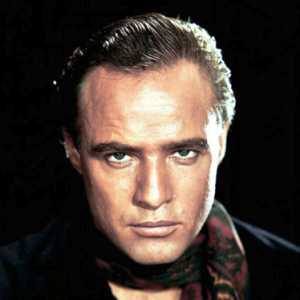Marlon Brando Jr. (April 3, 1924 – July 1, 2004) was an American actor. Considered one of the most influential actors of the 20th century, he received numerous accolades throughout his career, which spanned six decades, including two Academy Awards, two Golden Globe Awards, one Cannes Film Festival Award and three British Academy Film Awards. Brando was also an activist for many causes, notably the civil rights movement and various Native American movements. Having studied with Stella Adler in the 1940s, he is credited with being one of the first actors to bring the Stanislavski system of acting, and method acting, to mainstream audiences.
Brando was raised in Omaha, Nebraska. In the 1940s, he moved to New York City and fell under the influence of Stella Adler and the Stanislavski system of acting. Despite a string of unimpressive performances on stage, he was adept at reading his characters, and consistently anticipated where scenes flowed. Brando initially gained acclaim and his first Academy Award nomination for Best Actor in a Leading Role for reprising the role of Stanley Kowalski in the 1951 film adaptation of Tennessee Williams' play A Streetcar Named Desire, a role that he originated successfully on Broadway. He received further praise, and a first Academy Award and Golden Globe Award, for his performance as Terry Malloy in On the Waterfront. It remains a watershed moment in the history of Hollywood, and his work continues to be studied and interpreted. His portrayal of the rebellious motorcycle gang leader Johnny Strabler in The Wild One proved to be an emblem of the era's generational gap.
The 1960s saw Brando's career take a commercial and critical downturn. He directed and starred in the cult western One-Eyed Jacks, a commercial flop, after which he delivered a series of notable box-office failures, beginning with Mutiny on the Bounty (1962) which damaged his career. After ten years of underachieving and markedly diminished interest in his films, he agreed to do a screen test as Vito Corleone in Francis Ford Coppola's The Godfather (1972). He got the part and subsequently won his second Academy Award and Golden Globe Award in a performance considered among the finest in the art form's history, based on extensive surveys of critics, directors, and other actors. He declined the Academy Award due to "the treatment of American Indians today by the film industry ... and also with recent happenings at Wounded Knee", sending Sacheen Littlefeather to the televised ceremony to refuse the award and make a statement on his behalf. The Godfather became the highest-grossing film ever made, and alongside his Oscar-nominated performance in Last Tango in Paris (1972), Brando reestablished himself in the ranks of top box-office stars.
After a hiatus in the early 1970s, Brando was generally content with being a highly paid character actor in supporting roles of varying quality, such as Jor-El in Superman (1978), as Colonel Kurtz in Apocalypse Now (1979), and Adam Steiffel in The Formula (1980), before taking a nine-year break from film. According to the Guinness Book of World Records, Brando was paid a record $3.7 million ($17 million in inflation-adjusted dollars) and 11.75% of the gross profits for 13 days' work on Superman. The 1990s and the 2000s were marked with controversy for Brando, and his troubled private life received much attention. He struggled with mood disorders and legal issues. Brando continues to be held in high regard; he was one of only six actors named in 1999 by Time magazine in its list of the 100 Most Important People of the Century. In this list, Time also designated Brando as the "Actor of the Century".
